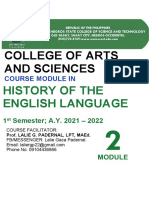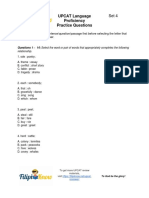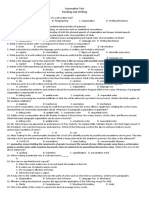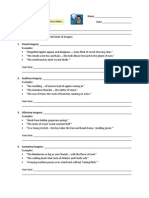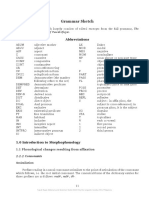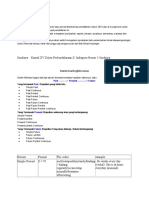Faulty Diction and 2
Faulty Diction and 2
Uploaded by
Vienalyne Binoggon BinwagCopyright:
Available Formats
Faulty Diction and 2
Faulty Diction and 2
Uploaded by
Vienalyne Binoggon BinwagCopyright
Available Formats
Share this document
Did you find this document useful?
Is this content inappropriate?
Copyright:
Available Formats
Faulty Diction and 2
Faulty Diction and 2
Uploaded by
Vienalyne Binoggon BinwagCopyright:
Available Formats
Topic: Identifying Sentence Errors
Chapter: Faulty Diction 1
Faulty Diction is when you choose wrong words in a sentence. We may use the word feared instead of scared in the sentence She was scared in the dark room. Common errors are using in an inappropriate manner the Relative Pronouns like who, whose, whom, which, that and what. For example: The boy whose fell off his bicycle has hurt his leg. The correct usage of the Relative Pronoun should be who. Use of Relative Pronouns Who is used for persons only. For example: Those who work hard are blessed. I know the hero whom you admire. Which is used for animals and things without life. For example: Tom found the cat which was lost. That is used for persons, animals and things. For example: The expensive dress that she was wearing had been bought in Paris. What is used for things only. For example: She said what she meant. Practice Questions Q1. James Thurbers Walter Mitty is a character which constantly daydreams to escape the A B harsh realities of his mundane existence. No error. C D E Answer: A B C D E Correct Answer: A Explanation: The correct answer is who instead of which. Q2. She was a business woman, an entrepreneur her best customers were her best friend. A B C D No error. E Answer: A B C D E Correct Answer: B Explanation: The correct answer is whose instead of her.
Q3. I was never tempted to become a tailor as it was tedious work, but I listened respectfully A B C however my father alluded to Paris. No error. D E Answer: A B C D E Correct Answer: D Explanation: The correct answer is whenever. Q4. That was my greatest fear_ to slide down some steep slope for hundreds of meters, A B knowing I was heading for a cliff and a long, hopeless drop to the rocks. No error. C D E Answer: A B C D E Correct Answer: E Explanation: There are no errors. Q5. In Homers heroic epic The Iliad, Ulysses is a lonely king which longs to sail to distant A B C D lands beyond the horizon. No error. E Answer: A B C D E Correct Answer: C Explanation: The correct answer is who instead of which. Q6. As his speech is inarticulate, it is very difficult to understand which he is trying to say. A B C D No errors. E Answer: A B C D E Correct Answer: C Explanation: The correct answer is what instead of which.
Topic: Identifying Sentence Errors
Chapter: Faulty Diction 2
Another common error in diction occurs when Adjectives and Adverbs are used erroneously. In other words an adjective is used instead of an adverb and vice versa. An adjective adds details to the noun (or the pronoun) or describes it. For example: She has a beautiful face. Adverbs tell us something about the action in a sentence by modifying a verb, an adjective, an adverb, a prepositional phrase, a sentence or a conjunction. The following sentences show how adverbs affect the meaning of a sentence. Compare: Tom has left. Tom has just left. She has finished her packing. She has nearly finished her packing. Practice Questions: Q1. With no regard for his own safety, Ray returned to rescue Patrick, but he was beaten A B back, worse burned by flames as high as a house. No error. C D E Answer: A B C D E Correct Answer: C Explanation: The adverb badly should be used instead of the adjective worse. Q2. Ahead was a fair easy stretch of trail and by early afternoon, they were setting up at the A B C Fish Harbour campsite. No error. D E Answer: A B C D E Correct Answer: A Explanation: The correct answer is the adverb fairly. Q3. Searching the beach, he noticed a roughly track in the brush and pushed aside the A B C branches to find himself staring at the back of another bear. No error. D E
Answer: A B C D E Correct Answer: B Explanation: The correct answer is the adjective rough. Q4. While they had been watching what they took to be the mother bear, the offspring had A B made off with their hugely food bag. No error. C D E Answer: A B C D E Correct Answer: D Explanation: The correct answer is the adjective huge. Q5. Legend has it that several Buddhist monks and priests worked by sun, reflectors and A B torchlight to create magnificent murals out of the sheer rock face. No errors. C D E Answer: A B C D E Correct Answer: E Explanation: There are no errors. Q6. Unimpressed with the prices he found at our one-hour photo shop outside Washington, a A B C customer asked where he might find a suitably deal than ours. No error. D E Answer: A B C D E Correct Answer: D Explanation: The correct answer is the adjective better.
You might also like
- Ngữ Pháp Nâng Cao. Sưu TầmDocument25 pagesNgữ Pháp Nâng Cao. Sưu TầmHuu Hiep Nguyen92% (13)
- CAPE Communication StudiesDocument27 pagesCAPE Communication StudiesKyla FraserNo ratings yet
- Communication Studies - Module 2 Lesson PlansDocument9 pagesCommunication Studies - Module 2 Lesson PlansMs-Devashia T Whyte100% (2)
- CSEC English SBA GuideDocument5 pagesCSEC English SBA GuideElijah Kevy DavidNo ratings yet
- Facilitators of Communication Cape Communication StudiesDocument6 pagesFacilitators of Communication Cape Communication StudiesKathya Cxc Medz Davis100% (1)
- CAPE-Communication Studies - Facilitators Barriers of CommunicationDocument2 pagesCAPE-Communication Studies - Facilitators Barriers of CommunicationVishmeta SeenarineNo ratings yet
- Quiz DemoDocument1 pageQuiz DemoLOIDA ALMAZANNo ratings yet
- Complaining Letter RubricDocument1 pageComplaining Letter RubricSara Paulina Castro R100% (1)
- Characteristics of CreoleDocument6 pagesCharacteristics of CreoleRikiba BainNo ratings yet
- Communication Studies - Module 2 Practice AnswersDocument3 pagesCommunication Studies - Module 2 Practice AnswersAbishua0% (1)
- Types of Claims: Prepared By: Jovelyn L. EspinoDocument21 pagesTypes of Claims: Prepared By: Jovelyn L. EspinoAlena Mae MorotaNo ratings yet
- Speech Rubric RevisedDocument1 pageSpeech Rubric RevisedVenoritaNo ratings yet
- Summary WritingDocument20 pagesSummary WritingCar Use100% (1)
- Test Questions On Position Papers Blooms Taxonomy Edition 10 ItemsDocument3 pagesTest Questions On Position Papers Blooms Taxonomy Edition 10 Itemsezabellesomolostro013No ratings yet
- Philippine LiteratureDocument3 pagesPhilippine LiteratureRefashe English50% (2)
- Communication StudiesDocument25 pagesCommunication StudiesAnonymous Azxx3Kp9100% (6)
- Graded Recitation in EnglishDocument32 pagesGraded Recitation in Englisht3xxaNo ratings yet
- 2004 Module 2 Essay: General Notes For Communication StudiesDocument4 pages2004 Module 2 Essay: General Notes For Communication StudiesJoelNo ratings yet
- High School Spelling Practice Worksheet 2 Directions: Circle All The Words That Are Misspelled. If No WordsDocument2 pagesHigh School Spelling Practice Worksheet 2 Directions: Circle All The Words That Are Misspelled. If No WordsTawni RubyNo ratings yet
- Scoring Rubric For Summary WritingDocument4 pagesScoring Rubric For Summary WritingduhneesNo ratings yet
- HUMSS Creative Writing CG 1Document8 pagesHUMSS Creative Writing CG 1Argie Ray Ansino ButalidNo ratings yet
- Cape Comms EbladDocument29 pagesCape Comms EbladAshley MorganNo ratings yet
- Basic Textual and Contextual Reading Approach in The Study and Appreciation of LiteratureDocument2 pagesBasic Textual and Contextual Reading Approach in The Study and Appreciation of LiteratureJames Andrew FloresNo ratings yet
- Section C of Communication StudiesDocument5 pagesSection C of Communication StudiesAshley MorganNo ratings yet
- Communication Studies Sample ResponsesDocument7 pagesCommunication Studies Sample ResponsesBryan AliNo ratings yet
- Day 3.3 and 3.4 PREPARING BIBLIOGRAPHIES AND OUTLINESDocument56 pagesDay 3.3 and 3.4 PREPARING BIBLIOGRAPHIES AND OUTLINESChristine Anne ClementeNo ratings yet
- O Captain! My CaptainDocument10 pagesO Captain! My Captaingalaxy gamerzNo ratings yet
- Cape 2009 Communication Studies Paper 2 Module 1Document3 pagesCape 2009 Communication Studies Paper 2 Module 1edlinrochford853340% (5)
- Elements of A Short StoryDocument4 pagesElements of A Short StoryA C100% (1)
- Communication Process Worksheet 1Document3 pagesCommunication Process Worksheet 1Vernon WhiteNo ratings yet
- College of Arts and Sciences: History of The English LanguageDocument11 pagesCollege of Arts and Sciences: History of The English LanguageKristine GaliciaNo ratings yet
- Outlining 1 Without Answer KeyDocument19 pagesOutlining 1 Without Answer KeyQuerubin MacadangdangNo ratings yet
- LPzionDocument9 pagesLPzionJoy Mariette CristoNo ratings yet
- UPCAT Language Proficiency Practice Questions Set 4Document10 pagesUPCAT Language Proficiency Practice Questions Set 4Francis BordonNo ratings yet
- English For Academic and Professional PurposesDocument2 pagesEnglish For Academic and Professional PurposesCarmela HernandezNo ratings yet
- Levels of Language UsageDocument12 pagesLevels of Language UsageMeryem YavuzNo ratings yet
- Literary Theories & Criticism: Chester M. DerequitoDocument42 pagesLiterary Theories & Criticism: Chester M. DerequitoSir PogiNo ratings yet
- A Detailed Lesson Plan in English Grade - Ix I. ObjectivesDocument2 pagesA Detailed Lesson Plan in English Grade - Ix I. ObjectivesRica Rama PenuelaNo ratings yet
- Evaluating Text - BasicDocument7 pagesEvaluating Text - BasicDiyaNo ratings yet
- RW 11 - 12 - Unit 5 - Lesson 1 - Comparison and ContrastDocument23 pagesRW 11 - 12 - Unit 5 - Lesson 1 - Comparison and ContrastFe Ann MonederoNo ratings yet
- Elements of ProseDocument2 pagesElements of ProseAlma Fara100% (2)
- Summative Test 3Document3 pagesSummative Test 3EVA MAE BONGHANOYNo ratings yet
- Question 5 Mark Scheme LatestDocument3 pagesQuestion 5 Mark Scheme LatestCåłłmėĎäddy100% (2)
- Types of ImageryDocument2 pagesTypes of ImageryConnor100% (1)
- Oral and Communications: Aldcs Vision - Mission StatementDocument6 pagesOral and Communications: Aldcs Vision - Mission StatementRON D.C.No ratings yet
- Department of Education: Learner'S Activity Sheet FOR Quarter 3, Week 2Document9 pagesDepartment of Education: Learner'S Activity Sheet FOR Quarter 3, Week 2Franzhean Balais CuachonNo ratings yet
- Grade Level: 12 Subject: English Unit: Poetry Topic: Poetry Meter Essential QuestionsDocument4 pagesGrade Level: 12 Subject: English Unit: Poetry Topic: Poetry Meter Essential Questionsapi-284019853No ratings yet
- Notes On The Emergent PeriodDocument2 pagesNotes On The Emergent PeriodReinopeter Koykoy Dagpin LagascaNo ratings yet
- Elimination Quiz Bee Grade 9Document32 pagesElimination Quiz Bee Grade 9Edson RovillosNo ratings yet
- Assessment of Learning 1 Test Construction Part 2Document5 pagesAssessment of Learning 1 Test Construction Part 2Princess SalvadorNo ratings yet
- Sentence Correction Subject Verb Agreement ModifiersDocument22 pagesSentence Correction Subject Verb Agreement Modifiersaryarajeev2204No ratings yet
- WINSEM2023-24 STS2022 SS VL2023240500285 2024-03-16 Reference-Material-IDocument31 pagesWINSEM2023-24 STS2022 SS VL2023240500285 2024-03-16 Reference-Material-Ijanaki NandhagopalNo ratings yet
- FALLSEM2022-23 BSTS201P SS VL2022230100137 Reference Material I 20-10-2022 Sentence Correction (Subject Verb Agreement Based Questions)Document40 pagesFALLSEM2022-23 BSTS201P SS VL2022230100137 Reference Material I 20-10-2022 Sentence Correction (Subject Verb Agreement Based Questions)Sri DNo ratings yet
- Sentence CorrectionDocument10 pagesSentence CorrectionAnthony Rey BayhonNo ratings yet
- Paper 5-Analogies, Synonyms, Antonyms & Sentence CompletionDocument15 pagesPaper 5-Analogies, Synonyms, Antonyms & Sentence CompletionJaveria YounisNo ratings yet
- Unit 8: Adjective and Adverb Clause A. Adjective Clause Adjecti Ve Reduce AdjectiveDocument6 pagesUnit 8: Adjective and Adverb Clause A. Adjective Clause Adjecti Ve Reduce AdjectiveFloritabenyNo ratings yet
- VRRC 170120Document2 pagesVRRC 170120Bogdan Berenghia100% (1)
- G7 - Term 1 Revision - Reading Comprehension - Summary - 24.11.23Document26 pagesG7 - Term 1 Revision - Reading Comprehension - Summary - 24.11.23jurymagdi430No ratings yet
- Reading Comprehension Practice TestDocument5 pagesReading Comprehension Practice Testblzz2netNo ratings yet
- English Grade 8Document27 pagesEnglish Grade 8rica_escladaNo ratings yet
- C Users Eri Desktop ALL TOEFL Sentence Completion Pract5Document8 pagesC Users Eri Desktop ALL TOEFL Sentence Completion Pract5fatbardhaNo ratings yet
- El Present Simple en Ingles - The Simple Present Tense: Negative FormDocument5 pagesEl Present Simple en Ingles - The Simple Present Tense: Negative FormMatias Alfredo VillagraNo ratings yet
- Sem.3 HEL Old English WIFMAN /WIMMAN (NE Woman) Developed From TwoDocument7 pagesSem.3 HEL Old English WIFMAN /WIMMAN (NE Woman) Developed From TwoDaniela Efros100% (1)
- Morphological Analyzer For TamilDocument37 pagesMorphological Analyzer For TamilArul DayanandNo ratings yet
- We KL ) : GB Aa V Q Av JVWPZ Cökœmg N (WJWLZ, MCQ I GŠWLK Cökœ-Dë Ii Ÿ Î Cö HVR )Document37 pagesWe KL ) : GB Aa V Q Av JVWPZ Cökœmg N (WJWLZ, MCQ I GŠWLK Cökœ-Dë Ii Ÿ Î Cö HVR )abd maminNo ratings yet
- Giving Suggestions and ObligationsDocument3 pagesGiving Suggestions and ObligationsNeni ChandraNo ratings yet
- Tuwali Dictionary Grammar SketchDocument112 pagesTuwali Dictionary Grammar SketchEquinoxNo ratings yet
- Irregular VerbsDocument3 pagesIrregular VerbsAilinNo ratings yet
- VocabularyDocument31 pagesVocabularybook wormNo ratings yet
- Dos and DonTSS ESSAY B2Document4 pagesDos and DonTSS ESSAY B2PatyNo ratings yet
- Words Are The Basic Units of AnalysisDocument2 pagesWords Are The Basic Units of AnalysisNorel Fhazieyla ElNo ratings yet
- List of Regular Verbs Infinitive Past Participle SignificadoDocument5 pagesList of Regular Verbs Infinitive Past Participle SignificadoYeimiNo ratings yet
- Grammar 1. The Future (Buduća Vremena)Document15 pagesGrammar 1. The Future (Buduća Vremena)Tarik225No ratings yet
- Morphological Conversion in English and Vietnamese TextbooksDocument19 pagesMorphological Conversion in English and Vietnamese TextbooksNguyen AnNo ratings yet
- DictDocument93 pagesDictCarlos CiroNo ratings yet
- Both - Ambos Either - Cualquiera de Los Dos Neither - Ninguno (De Dos)Document15 pagesBoth - Ambos Either - Cualquiera de Los Dos Neither - Ninguno (De Dos)PepeArandaNo ratings yet
- Objectives: Identify The Parts of Speech Determine The Part of Speech by Analyzing The Use of Those Words in SentencesDocument22 pagesObjectives: Identify The Parts of Speech Determine The Part of Speech by Analyzing The Use of Those Words in SentencesnikaNo ratings yet
- Idioms and Idiomatic Expressions PDFDocument38 pagesIdioms and Idiomatic Expressions PDFCarla AlatristaNo ratings yet
- Adverbs of IntensityDocument5 pagesAdverbs of IntensityBerth Obusan DayloNo ratings yet
- Irregular Verbs ExercisesDocument2 pagesIrregular Verbs ExercisesJose Manuel ASNo ratings yet
- Derivational Morpheme or Inflectional Morpheme-A Case Study of "-Ing" or "-Ed" Word Ending in English Linguistics TeachingDocument9 pagesDerivational Morpheme or Inflectional Morpheme-A Case Study of "-Ing" or "-Ed" Word Ending in English Linguistics TeachingCảnh Lương ThầnNo ratings yet
- Hoobastank The ReasonDocument4 pagesHoobastank The ReasonAndrésZambranoNo ratings yet
- Verblista InglesDocument3 pagesVerblista Inglescharles izquierdoNo ratings yet
- CalcetinesDocument3 pagesCalcetinesLiviu Mihai LeordeanuNo ratings yet
- All Things GrammarDocument174 pagesAll Things GrammarSiva KarthikNo ratings yet
- Lista VerbosDocument3 pagesLista VerbosAnabel PoaquizaNo ratings yet
- Verb PatternsDocument9 pagesVerb PatternsMANUELA BELÉN LAGOS AROSNo ratings yet
- What Are Verbs?Document9 pagesWhat Are Verbs?Angeline Panaligan AnselaNo ratings yet
- Workshop On Syntax - NellysDocument4 pagesWorkshop On Syntax - Nellysnellys marinNo ratings yet
- Materi Soal English Lesson: Past - Present - Future PastDocument8 pagesMateri Soal English Lesson: Past - Present - Future PastghaniNo ratings yet






























